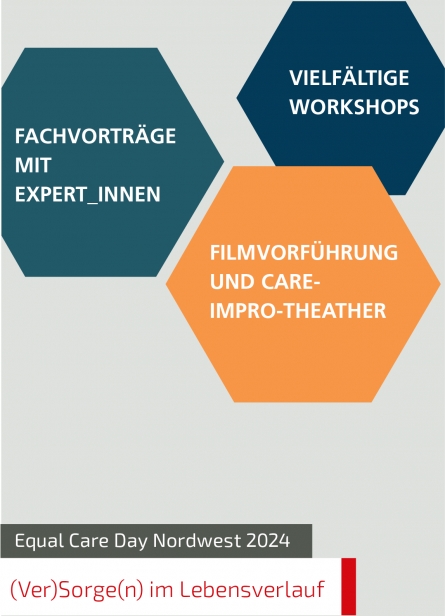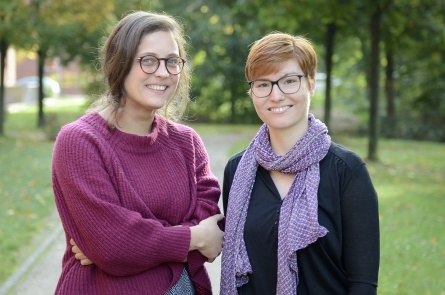Thursday, March 14, 2024, from 12 to 4 p.m. at the Jade University of Applied Sciences in Wilhelmshaven.Equal Care Day (ECD) regularly draws attention to the importance of a fair and equal distribution of care work. On February 29, this year's day of action of the Equal Care Day initiative will take place in many cities and virtually. Equal Care Day is an initiative of klische*esc e.V., a non-profit association for the promotion of freedom of choice beyond limiting role stereotypes.
The Equal Care Day initiative calls on people, institutions and associations worldwide to organize the Equal Care Day as an opportunity to once again draw attention to the lack of appreciation and unfair distribution of care work. The campaigns achieve this by using events, campaigns, manifestos and projects of all kinds to focus on the fact that care work and care, care workers and carers are all too often poorly rewarded or not rewarded at all in our society and the current economic system. With this in mind, an ECD festival will also be held in many places and on an online platform in 2024.
The organizers of the Equal Care Day Northwest 2024 Andrea Schäfer (University of Bremen), Nicole Biela (City of Wilhelmshaven) and Ann-Kathrin Cramer (District of Friesland) make it clear in the spirit of the ECD "Care work affects us all, sooner or later in the course of our lives, but we are confronted with very different regional structures and a social policy that only partially integrates care work in its concept. We have all been aware of the consequences for years, now there must finally be solutions. We want to discuss these together on March 14, 2024 at Equal Care Day Northwest 2024 with care workers, experts and decision-makers from politics and business and all interested, thus all who are dependent on care work as."
Equal Care Day Northwest 2024
Equal Care Day Northwest 2024 explores the question of "care work in the course of life" with a particular focus on care work in the various regions in the northwest - from Friesland to Wilhelmshaven to Bremen, in the cities and municipalities. This raises questions about possible solutions in the health and care system in the northwest region: What gaps in care and moral injuries arise in the face of reparative social policies and a view of the caring profession that socially marginalizes women and exposes them to ridicule. What does a model of preventative social policy that focuses on a new normality of gainful employment and care in the life course look like? Who are the people who work day and night in Germany's health and care system to ensure that we are well looked after, can recover or die with dignity? How can everyday life in care or the routines of care workers in the private sphere be made visible with the help of the carers? What operational and political options for action are there to change the working conditions in elderly care in a concrete and sustainable way? What are the needs of young carers and their families and what gaps are there in the support services in the regions? The network, which was founded specifically for this purpose, invites all interested to discuss, learn and experience together.
Program of the ECD Northwest 2024
(from 12:00 p.m.) Greetings
Ann-Kathrin Cramer (District of Friesland)
Prof. Dr.-Ing. Holger Saß (Jade University of Applied Sciences)
Birgit Ahn (Metropolitan Region Northwest)
(from 12:15 p.m.) Can it happen to anyone? Care and nursing from a gender perspective
Reading by Monja Schünemann (medical historian and specialist nurse) from her book " Der Pflege-Tsunami. Wie Deutschland seine Alten und Kranken im Stich lässt."
(from 13:05) Das Optionszeitenmodell. Time for care, time for equality.
Keynote speech and discussion by Dr. Karin Jurczyk (Deputy Chairwoman of the German Society for Time Policy) and Prof. Ulrich Mückenberger (University of Bremen)
Parallel workshops from 14:15 (participation only possible on site)
o Concrete and sustainable improvement of working conditions in geriatric care - ideas for a relief and skilled worker offensive in the care sector
Workshop with keynote speech and discussion by Greta-Marleen Storath (Bremen Chamber of Employees)
o "That doesn't even exist!" Your improvised care story.
Workshop with methods of improvisational theater by Lena Breuer (actress, moderator and trainer from Cologne)
o Who cares? Who cares that we care?
Workshop with film screening and discussion by Ann-Kathrin Cramer (District of Friesland)
o Giving care. Getting help: Young carers
Workshop with researcher and committed people in dialog by Andrea Schäfer (University of Bremen) with Prof. Dr. Claudia Stoll (Bremen University of Applied Sciences)
The 'Equal Care Day Northwest 2024' network
The 'Equal Care Day Northwest 2024' network is a cooperation between Jade University of Applied Sciences, the University of Bremen, the district of Friesland and the city of Wilhelmshaven. Also involved in the network are the Bremen Chamber of Employees, the Friesland education region, the equal opportunities officers of the municipalities of Friesland, Zetel, Wangerland and Sande, the Agenda Varel association, the city of Jever and other committed individuals. The organizers are Andrea Schäfer (University of Bremen), Nicole Biela (City of Wilhelmshaven), Ann-Kathrin Cramer (District of Friesland) and Mareike Sprock (Jade University of Applied Sciences). Andrea Schäfer is organizing the ECD in Bremen for the fourth time.
Further information:
The Equal Care Day Northwest 2024 will take place on Thursday, March 14, 2024, from 12 to 4 p.m. at the Jade University of Applied Sciences in Wilhelmshaven. The event is open to the public, partly digital (12 to 2 p.m.) and free of charge. (event in German without translation)
You can register here.
Here you can find the flyer of the event! (only in German)
For further questions, please contact:
Andrea Schäfer
CRC 1342 "Global Dynamics of Social Policy"
University of Bremen
email: andrea.schaefer@uni-bremen.de
phone: + 49 421 218-57095
Nicole Biela (Equal Opportunities Officer)
Stadt Wilhelmshaven
Rathausplatz 1
26382 Wilhelmshaven
email: Nicole.Biela@wilhelmshaven.de
phone: +49 4421 162302
Ann-Kathrin Cramer (Equal Opportunities Officer)
Landkreis Friesland
Lindenallee 1
26441 Jever
email: a.cramer@friesland.de
phone: +49 4461 919-6161
Funded by METROPOLREGION NORDWEST
Contact:Andrea Schäfer
















